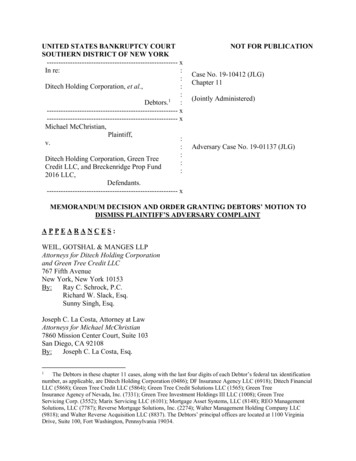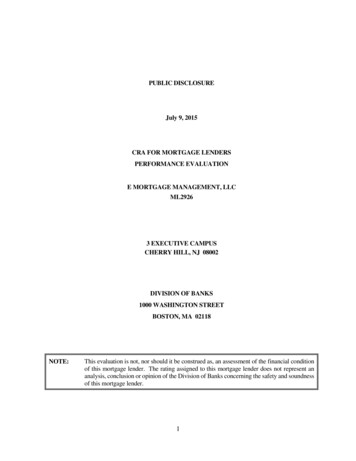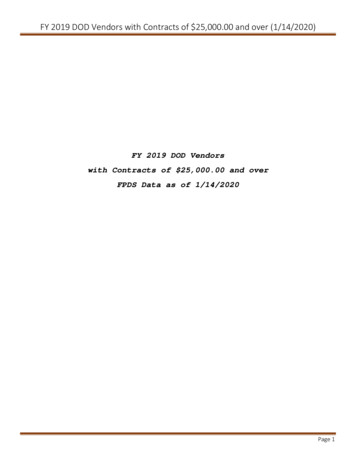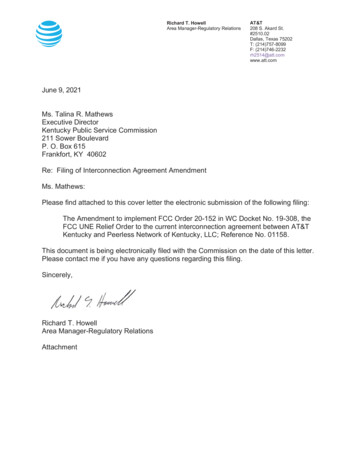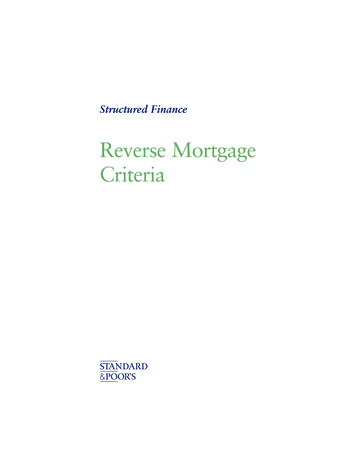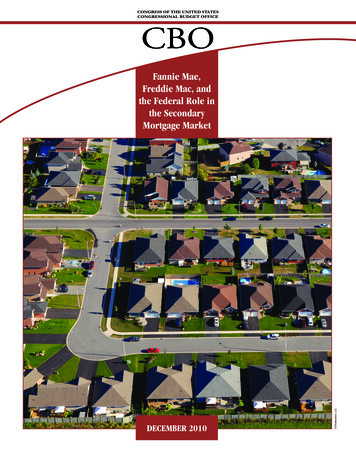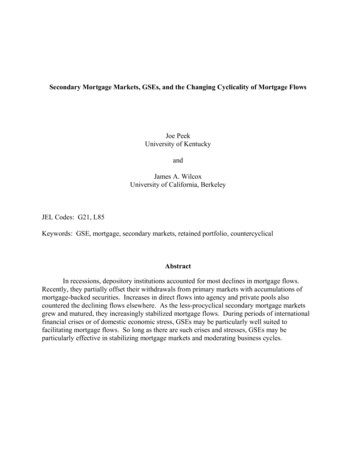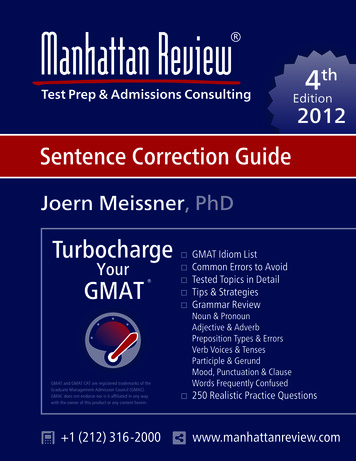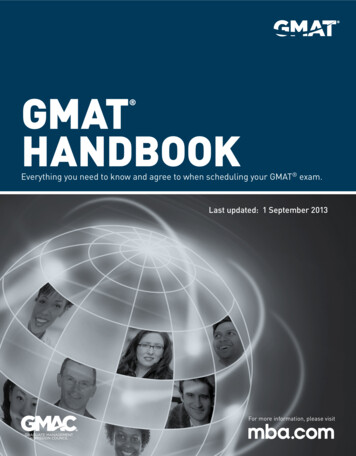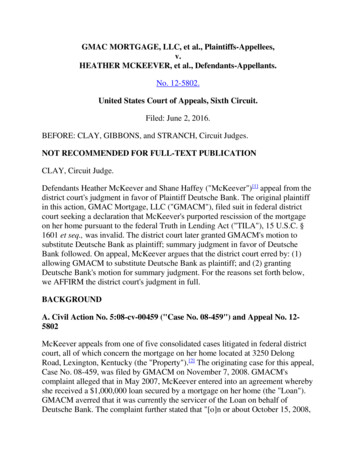
Transcription
GMAC MORTGAGE, LLC, et al., Plaintiffs-Appellees,v.HEATHER MCKEEVER, et al., Defendants-Appellants.No. 12-5802.United States Court of Appeals, Sixth Circuit.Filed: June 2, 2016.BEFORE: CLAY, GIBBONS, and STRANCH, Circuit Judges.NOT RECOMMENDED FOR FULL-TEXT PUBLICATIONCLAY, Circuit Judge.Defendants Heather McKeever and Shane Haffey ("McKeever")[1] appeal from thedistrict court's judgment in favor of Plaintiff Deutsche Bank. The original plaintiffin this action, GMAC Mortgage, LLC ("GMACM"), filed suit in federal districtcourt seeking a declaration that McKeever's purported rescission of the mortgageon her home pursuant to the federal Truth in Lending Act ("TILA"), 15 U.S.C. §1601 et seq., was invalid. The district court later granted GMACM's motion tosubstitute Deutsche Bank as plaintiff; summary judgment in favor of DeutscheBank followed. On appeal, McKeever argues that the district court erred by: (1)allowing GMACM to substitute Deutsche Bank as plaintiff; and (2) grantingDeutsche Bank's motion for summary judgment. For the reasons set forth below,we AFFIRM the district court's judgment in full.BACKGROUNDA. Civil Action No. 5:08-cv-00459 ("Case No. 08-459") and Appeal No. 125802McKeever appeals from one of five consolidated cases litigated in federal districtcourt, all of which concern the mortgage on her home located at 3250 DelongRoad, Lexington, Kentucky (the "Property").[2] The originating case for this appeal,Case No. 08-459, was filed by GMACM on November 7, 2008. GMACM'scomplaint alleged that in May 2007, McKeever entered into an agreement wherebyshe received a 1,000,000 loan secured by a mortgage on her home (the "Loan").GMACM averred that it was currently the servicer of the Loan on behalf ofDeutsche Bank. The complaint further stated that "[o]n or about October 15, 2008,
[McKeever] sent correspondence to" GMACM purporting to rescind the Loanunder the TILA and a regulation promulgated thereunder, 12 C.F.R. § 226.23("Regulation Z"). (No. 08-459, R. 1, PageID 2.)Regulation Z states, in pertinent part:(a) Consumer's right to rescind.(1) In a credit transaction in which a security interest is or will be retained oracquired in a consumer's principal dwelling, each consumer whose ownershipinterest is or will be subject to the security interest shall have the right to rescindthe transaction . . . .(2) To exercise the right to rescind, the consumer shall notify the creditor of therescission by mail, telegram or other means of written communication. . . .(3) The consumer may exercise the right to rescind until midnight of the thirdbusiness day following consummation, delivery of the notice required byparagraph (b) of this section, or delivery of all material disclosures, whicheveroccurs last. If the required notice or material disclosures are not delivered, the rightto rescind shall expire 3 years after consummation, upon transfer of all of theconsumer's interest in the property, or upon sale of the property, whichever occursfirst. . . .12 C.F.R. § 226.23 (footnotes omitted).[3] GMACM's complaint maintained that"[McKeever] ha[s] not provided any specific detail as to any TILA violations thatwould give rise to the purported recission [sic], and ha[s] given no other legitimatebasis for the recission [sic]." (No. 08-459, R. 1, PageID 3.)McKeever thereafter filed a motion for judgment on the pleadings noting that in arelated federal district court action concerning the Property—Civil Action No.5:08-cv-00510 ("Case No. 08-510")—GMACM had argued that it was not the"real party in interest" to the Loan because it was merely "the current servicer ofthe loan on behalf of Deutsche Bank as trustee." (No. 08-459, R. 22, PageID 9899.) McKeever argued that GMACM's claims against her should therefore bedismissed for lack of standing.In response to McKeever's motion, the district court ordered GMACM to supplysupplemental briefing on Federal Rule of Civil Procedure 17's requirement that anaction be prosecuted in the name of the real party in interest. GMACM answeredwith a motion to substitute Deutsche Bank as plaintiff. In that motion, GMACM:(1) maintained that it had standing because it was the servicer of the Loan, andbecause McKeever sent her rescission letter to GMACM; and (2) requested that
Deutsche Bank be substituted as plaintiff "in an abundance of caution." (No. 08459, R. 39, PageID 243-44.) The district court granted GMACM's motion tosubstitute pursuant to Rule 17(a)(3) and denied McKeever's motion for judgmenton the pleadings as moot.Proceeding as Plaintiff, Deutsche Bank filed a motion for summary judgment. Inthat motion, Deutsche Bank argued that McKeever's TILA rescission claim in CaseNo. 08-459 was barred under the doctrines of res judicata and law-of-the-casebecause the district court's ruling in Case No. 08-510 already disposed of thoseclaims. The district court agreed and issued an order granting summary judgmentto Deutsche Bank. In its order, the district court held:This court . . . has previously held that [McKeever's] allegation of a rescission iswithout merit. [McKeever's] rescission claim in [Case No. 08-510] was rejectedwhen they asserted the claim as plaintiffs against GMAC. . . . Here, [McKeever]provide no new information on the issue that would constitute an extraordinarycircumstance justifying a divergence from the court's prior holdings; therefore, thelaw-of-the-case doctrine makes the court's earlier rulings binding, and[McKeever's] rescission claim is invalid.(No. 08-459, R. 135, PageID 1318-19.) McKeever timely appealed.B. Case No. 08-510As noted above, the district court order from which McKeever now appeals wasdecided on the basis of the "law-of-the-case" doctrine, citing a ruling in Case No.08-510. We therefore discuss the relevant history of that case below.McKeever filed Case No. 08-510 in Kentucky state court on November 21, 2008,[4]naming as defendants: (1) Mortgage Electronic Registration Systems, Inc.("MERS"); (2) GMACM; and (3) "Concealed and Unknown Persons who are the Real Parties in Interest,'" for whom GMACM is "the Loan Servicing Agent." (No.08-510, R. 1-4, PageID 12-13.) Case No. 08-510 concerned the same Loan securedby a mortgage on McKeever's home at issue in Case No. 08-459. McKeever'scomplaint made twelve claims against the named defendants in that case, includinga claim for rescission under TILA and Regulation Z. Her complaint alleged, forexample, that "[t]he Homeowners seek a remedy under . . . TILA . . . to obtainrescission recognition." (Id. at 14.)McKeever's suit was removed to federal court, whereupon GMACM filed a motionto dismiss pursuant to 12(b)(6). In analyzing GMACM's motion, the district court
observed that McKeever "claim[s] to have rescinded the Note and Mortgage underthe [TILA]" via the October 2008 letters sent to GMACM and MERS. (No. 08510, R. 17, PageID 134.) The court then found:The [October 2008] letters sought to rescind the Note and Mortgage and demandeda refund of all funds and interest paid. There are no statements in the letters thatGMAC had violated any statute and no factual support for any role by GMAC,other than providing information upon request.(Id. at 138.) On that basis, the district court granted GMACM's motion anddismissed all of McKeever's claims—including those relating to rescission underthe TILA—against GMACM.With McKeever's claims against GMACM dismissed, litigation in Case No. 08510 continued against the remaining named defendant, MERS. The district courtlater granted MERS's motion for summary judgment and entered final judgmentagainst McKeever. McKeever filed a motion to reconsider, arguing, inter alia, thatthe case should remain open so she could prosecute her claims against the " JohnDoe' Defendants, (the actual owners of McKeever's mortgage loan)."[5] (No. 08459, R. 81, PageID 616-17.)[6] The district court denied that motion, holding thatMcKeever failed to follow the proper procedures for pursuing claims againstunknown defendants.McKeever appealed from the judgment in Case No. 08-510, but this Court laterdismissed that appeal for lack of prosecution. McKeever's subsequent motions toreinstate the appeal were denied.DISCUSSIONI. The District Court Did Not Err by Granting GMACM's Motion toSubstitute Deutsche Bank as PlaintiffStandard of ReviewQuestions regarding a plaintiff's Article III standing are reviewed de novo. Schultzv. United States, 529 F.3d 343, 349 (6th Cir. 2008).AnalysisBelow, McKeever moved for judgment on the pleadings, arguing that mortgageservicer GMACM lacked standing to bring claims related to the Loan because
Deutsche Bank actually held the mortgage. The district court denied that motion asmoot after granting GMACM's motion to substitute Deutsche Bank as plaintiff. Onappeal, McKeever notes that "[t]he Order Granting the Motion to Substitute cites toRule 17(a), but is silent as to the threshold issue of standing." (Pet'rs' Br. at 28.)She thereafter contends that the district court lacked jurisdiction to grantGMACM's Rule 17(a) motion because GMACM did not have standing to makethat motion in the first place. Although McKeever cites no cases in support of thisargument, the argument has some merit.Federal Rule of Civil Procedure 17(a)(1) requires that an action "be prosecuted inthe name of the real party in interest." The Rule goes on to state:The court may not dismiss an action for failure to prosecute in the name of the realparty in interest until, after an objection, a reasonable time has been allowed for thereal party in interest to ratify, join, or be substituted into the action. Afterratification, joinder, or substitution, the action proceeds as if it had been originallycommenced by the real party in interest.Fed. R. Civ. P. 17(a)(3). Deutsche Bank argues that this language renders standingdefects moot upon the substitution of the real party in interest. However, in ZurichIns. Co. v. Logitrans, Inc., 297 F.3d 528 (6th Cir. 2002), we held that where aplaintiff "admittedly has not suffered injury in fact by the defendants, it had nostanding . . . to make a motion to substitute the real party in interest [under Rule17]." Id. at 531.In Zurich, the plaintiff insurance company filed a claim on behalf of its purportedinsured. Id. at 530. It was later discovered that the actual insurer was a sistercompany of the plaintiff—both insurance companies were under commonownership of a single "grandparent" entity. See id. at 533 (Gilman, J., concurring).The defendant moved to dismiss the plaintiff's suit for lack of standing; theplaintiff moved to substitute its sister company pursuant to Rule 17(a). Id. at 530.The district court granted the defendant's motion and dismissed the suit. Id. Weaffirmed dismissal of the action for lack of standing, holding that Rule 17(a) couldnot be used to allow the true insurer, "which was not vigilant in protecting itsclaims," the benefit of the plaintiff insurance company's mistake. Id. at 532. "TheFederal Rules of Civil Procedure cannot expand the subject matter jurisdiction offederal courts," we explained, and Rule 17(a) "must be read with the limitation thata federal district court must, at a minimum arguably have subject matterjurisdiction over the original claims." Id. at 531.
Zurich thus establishes that in order for GMACM to have succeeded on its motionto substitute Deutsche Bank, it must have had standing to pursue that motion in thefirst instance. "The well established' law of Article III standing requires aplaintiff to allege personal injury fairly traceable to the defendant's allegedlyunlawful conduct and likely to be redressed by the requested relief.'" Murrayv. U.S. Dep't of Treasury, 681 F.3d 744, 748 (6th Cir. 2012) (quoting Hein v.Freedom From Religion Found., Inc., 551 U.S. 587, 598 (2007)). The plaintiff'sinjury, moreover, must be "(a) concrete and particularized . . . and (b) actualor imminent, not conjectural or hypothetical." Lujan v. Defs. of Wildlife, 504U.S. 555, 560 (1992) (internal citations and quotation marks omitted). "We lookto the complaint and any accompanying materials in deciding standingquestions." Murray, 681 F.3d 748.We find that unlike the plaintiff in Zurich, GMACM has proffered facts sufficientto establish its own Article III standing and, therefore, to pursue its motion tosubstitute Deutsche Bank as plaintiff. GMACM's complaint alleged that it was theservicer of the McKeever's loan on behalf of Deutsche Bank. At least one of oursister circuits has found that the rights held by a loan servicer grant it standingto prosecute cases relating to the debt that it services. See Greer v. O'Dell, 305F.3d 1297, 1302 (11th Cir. 2002) ("[T]he sole issue before us is whether a loanservicer is a real party in interest' with standing to conduct, through licensedcounsel, the legal affairs of the investor relating to the debt that it services. Weanswer this question in the affirmative."); see also In re Woodberry, 383 B.R. 373,376-79 (Bankr. D.S.C. 2008) (collecting cases and holding that a loan servicerwith a contractual duty to collect payments and foreclose mortgages hasstanding to move for relief of stay in bankruptcy proceedings involving theloan being serviced).GMACM's motion to substitute provided additional information establishingGMACM's standing to pursue that motion. Attached to the motion was theservicing agreement between Deutsche Bank and GMACM. That agreement statesthat as servicer of Deutsche Bank's loans, GMACM was entitled to certaincompensation, including "assumption fees, late payment charges, [and] investmentincome . . . ." (No. 08-459, R. 39-1, Decl. of Judy Faber, PageID 281.) GMACMnecessarily stood to lose any such compensation that arose from servicingMcKeever's loan as a result of her purported rescission. GMACM thereforeestablished "concrete and particularized" injuries that were "fairly traceable to"McKeever's conduct. See Lujan, 504 U.S. 560 (internal alterations and quotationmarks omitted). Thus, GMACM had standing to pursue its motion to substitute
Deutsche Bank as the real party in interest, and the district court did not err byaddressing that motion on the merits.II. McKeever's TILA Rescission Claim in Case No. 08-459 Is Barred by theDistrict Court's Judgment in Case No. 08-510Standard of ReviewAlthough a district court has some discretion to revisit an already-decided issue orlet its decision stand as "law of the case," see United States v. Todd, 920 F.2d 399,403 (6th Cir. 1990), "[w]hether a prior decision constitutes law of the case is alegal issue that we review de novo." Stewart v. Beach, 701 F.3d 1322, 1329 (10thCir. 2012); see also 36 C.J.S. Federal Courts § 602 (2016) ("[w]hether the law-ofthe-case doctrine applies in a specific instance is a question of law"). Applicationof the doctrine of res judicata is also a question of law to be reviewed de novo.Bragg v. Flint Bd. of Educ., 570 F.3d 775, 776 (6th Cir. 2009).AnalysisBelow, the district court held that McKeever's TILA rescission claim was barredby the court's prior ruling in consolidated Case No. 08-510. In so doing, the courtcited to the "law-of-the-case" doctrine. On appeal, Deutsche Bank argues that thedistrict court properly applied that doctrine; and, in the alternative, that the districtcourt's judgment in Case No. 08-510 was res judicata, thus constituting anotherbasis on which we may affirm. See La. Sch. Emps.' Ret. Sys. v. Ernst & Young,LLP, 622 F.3d 471, 477 (6th Cir. 2010) ("[W]e may affirm the judgment of thedistrict court on any ground supported by the record."). For the reasons discussedbelow, we conclude that the law-of-the-case doctrine was inappropriately appliedin this case, but we agree that res judicata provides another basis on which toaffirm.A. Law-Of-The-Case DoctrineThe law-of-the-case doctrine "provides that the courts should not reconsider amatter once resolved in a continuing proceeding." Howe v. City of Akron, 801F.3d 718, 739 (6th Cir. 2015) (internal quotation marks omitted). Describing thedoctrine, the Supreme Court has stated:A court has the power to revisit prior decisions of its own or of a coordinatecourt in any circumstance, although as a rule courts should be loathe to do so
in the absence of extraordinary circumstances such as where the initialdecision was "clearly erroneous and would work a manifest injustice."Christianson v. Colt Indus. Operating Corp., 486 U.S. 800, 817 (1988).[7] Thus,like the doctrines of claim and issue preclusion, law-of-the-case is designed to"prevent[] the relitigation of an issue once there has been a judgment on themerits." Bowles v. Russell, 432 F.3d 668, 676 (6th Cir. 2005) (citing 18 Moore'sFederal Practice § 134.20 (Matthew Bender 3d ed.)); see also Howe, 801 F.3d at740 (observing that law-of-the-case doctrine "is a prudential practice" intended "toencourage efficient litigation and deter indefatigable diehards" (internal quotationmarks omitted)).Unlike claim or issue preclusion, however, the law-of-the-case doctrine is notused to prevent relitigation of the same issues across different cases; rather,"[t]he purpose of the law-of-the-case doctrine is to ensure that the same issuepresented a second time in the same case in the same court should lead to thesame result." Howe, 801 F.3d at 739 (emphases in original) (internal quotationmarks omitted); see also Arizona v. California, 460 U.S. 605, 618 (1983) ("the[law-of-the-case] doctrine posits that when a court decides upon a rule of law,that decision should continue to govern the same issues in subsequent stages inthe same case"); 18B Charles Alan Wright et al., Federal Practice & Procedure:Jurisdiction & Related Matters § 4478 (4th ed. 2015) ("Law-of-the-case ruleshave developed to maintain consistency and avoid reconsideration of mattersonce decided during the course of a single continuing lawsuit. They do notapply between separate actions." (footnotes omitted)); Joan Steinman, Law ofthe Case: A Judicial Puzzle in Consolidated and Transferred Cases and inMultidistrict Litigation ("Law of the Case"), 135 U. Pa. L. Rev. 595, 597-98 (1987)(describing law-of-the-case doctrine as "a concept that precludes therelitigation of issues within the context of a single case once they have beendecided").This raises the question of whether consolidated cases, like those at issue here, canbe considered the "same case" for law-of-the-case purposes. In answering thisquestion, we begin with the well-established principle "that consolidated casesremain separate actions." Beil v. Lakewood Eng'g & Mfg. Co., 15 F.3d 546, 551(6th Cir. 1994). "[A]lthough consolidation is permitted as a matter ofconvenience and economy in administration, it does not merge the suits into asingle cause, or change the rights of the parties, or make those who are partiesin one suit parties in another." Lewis v. ACB Bus. Servs., Inc., 135 F.3d 389, 412(6th Cir. 1998) (internal brackets and quotation marks omitted) (quoting Johnson v.
Manhattan Ry., 289 U.S. 479, 496-97 (1933)). Using the law-of-the-case doctrineto bar relitigation of similar issues across consolidated cases would therefore seemto implicate the bedrock principle of due process that "one is not bound by ajudgment in personam in a litigation in which he is not designated as a party or towhich he has not been made a party by service of process." Hansberry v. Lee, 311U.S. 32, 40 (1940).We note, however, that this principle of due process is not offended when ajudgment from one case is used to bar relitigation in a different case, so long as"the party against whom an estoppel is asserted had a full and fair opportunity tolitigate" the precluded claim or issue in the first action. Blonder-Tongue Labs., Inc.v. Univ. of Ill. Found., 402 U.S. 313, 329 (1971). This is the concept of resjudicata, see id., which encompasses both the claim- and issue-preclusiondoctrines. Mitchell v. Chapman, 343 F.3d 811, 818 n.5 (6th Cir. 2003). Whatdifferentiates the preclusion doctrines from law-of-the-case, however, are theirmore rigorous analyses that ensure they are applied to bar only those claims orissues that have been fully and fairly litigated. See Blonder-Tongue, 402 U.S. at329 (describing the determination of a prior full and fair opportunity to litigate as"a most significant safeguard").The common law rules governing use of the law-of-the-case doctrine areunderstandably less involved: because the doctrine presumes application within asingle case, and thus an identity of parties and claims, see Howe, 801 F.3d at 739,the sole requirement for its application is that the court must have already "actuallydecided" the relevant issue. Id. at 739-40 (noting, for example, that an issue has notbeen "actually decided" where it was "assumed without decision for purposes ofresolving another issue"). That limited inquiry, however, will not always besufficient to protect the parties' rights when barring claims across consolidatedcases. This is especially true in circumstances where the consolidated cases involvedifferent parties or different underlying factual circumstances. In such instances,applying the more rigorous inquiries of claim or issue preclusion will better ensurethat only fully and fairly litigated claims or issues are barred. Cf. Rekhi v.Wildwood Indus., Inc., 61 F.3d 1313, 1317 (7th Cir. 1995) ("The doctrine thatlimits the relitigation of an issue in a subsequent suit, as opposed to asubsequent stage of the same suit, is collateral estoppel, not law of the case.").Based on the above, we hold that the district court erred by using the law-of-thecase doctrine to preclude McKeever's TILA rescission claim in Case No. 08-459on the basis that the court had already decided that issue against her inconsolidated Case No. 08-510. Although those two cases were consolidated for the
sake of convenience and judicial economy, such consolidation did not merge theminto a single cause. Lewis, 135 F.3d at 412. Moreover, as evidenced by ourdiscussion in section II-B, infra, a more thorough analysis was needed to determinewhether it was fair to preclude McKeever from relitigating her TILA rescissionclaim against Deutsche Bank where she previously litigated that claim againstGMACM. Thus, the district court should have applied either claim or issuepreclusion to analyze whether McKeever's TILA rescission claim was barred inCase No. 08-459. See Rodriguez v. Passinault, 637 F.3d 675, 689 n.6 (6th Cir.2011) (concluding in dicta that the law-of-the-case doctrine does not applybetween consolidated cases because "consolidation under Fed. R. Civ. P. 42 doesnot render rulings in one case applicable to a consolidated action"); Steinman, Lawof the Case, 135 U. Pa. L. Rev. at 626 ("[A] court faced with an apparent law of thecase problem should first ask whether the requested ruling is on an issue that hasbeen previously decided in the particular case, and not merely in anothercomponent of the consolidation.").B. Res JudicataAs noted above, Deutsche Bank argues that we may affirm the district court'sjudgment on alternative grounds: regardless of whether the district courtappropriately applied the law-of-the-case doctrine to bar McKeever's TILArescission claim in Case No. 08-459, that claim was barred because the districtcourt's judgment in Case No. 08-510 constituted res judicata. "Res judicatagenerally includes two separate concepts—claim preclusion and issuepreclusion." Mitchell, 343 F.3d at 818 n.5. In this instance, Deutsche Bank relieson claim preclusion, which "refers to effect of a prior judgment in foreclosing asubsequent claim that has never been litigated, because of a determination that itshould have been advanced in an earlier action." Id. McKeever, Deutsche Bankargues, could and should have fully litigated her TILA rescission claim in CaseNo. 08-510, and therefore that claim is barred."The preclusive effect of a federal-court judgment is determined by federalcommon law." Taylor v. Sturgell, 553 U.S. 880, 891 (2008). Under the federalcommon law doctrine of claim preclusion, "a final judgment on the meritsbars further claims by parties or their privies based on the same cause ofaction." Bragg, 570 F.3d at 776 (quoting Montana v. United States, 440 U.S. 147,153 (1979)).Under this Court's articulation of [claim preclusion], a claim will be barred byprior litigation if the following elements are present: (1) a final decision on the
merits by a court of competent jurisdiction; (2) a subsequent action betweenthe same parties or their "privies"; (3) an issue in the subsequent action whichwas litigated or which should have been litigated in the prior action; and (4)an identity of the causes of action.Bittinger v. Tecumseh Prods. Co., 123 F.3d 877, 880 (6th Cir. 1997) (emphasis inoriginal).In this case, there is no dispute that Case No. 08-510 ended in a final decision onthe merits by a court of competent jurisdiction. Moreover, Case No. 08-459involved an issue— namely, whether McKeever's letters effected a valid rescissionof the Loan—which either was or should have been fully litigated in Case No. 08510. Finally, both cases arose out of McKeever's mortgage on the Property andtherefore involved the same causes of action. See Browning v. Levy, 283 F.3d 761,773-74 (6th Cir. 2002) (holding identity of causes of action element satisfied where"the claims arose out of the same core of operative facts"). Thus, the primary issueis whether Deutsche Bank is entitled to the benefits of the district court's judgmentagainst McKeever on her TILA rescission claim in Case No. 08-510, even thoughDeutsche Bank was not a named party in that case.As the above recitation of the elements of claim preclusion indicates, a party in asubsequent action may receive the benefit of a prior judgment if it is in "privity"with a named party. Bittinger, 123 F.3d at 880. We note, however, that the term"privity" by itself is not particularly instructive. See, e.g., Restatement (Second) ofJudgments § 62 cmt. c (1982) ("[T]he term privity,' unless it refers to somedefinite legal relationship . . . is so amorphous that it often operates as a conclusionrather than an explanation."); 18A Wright et al., Federal Practice & Procedure:Jurisdiction & Related Matters § 4449 (4th ed. 2015) ("[I]t has come to berecognized that the privity label simply expresses a conclusion that preclusion isproper."); Taylor, 553 U.S. at 894 n.8 (noting that the term "privity" has "come tobe used . . . as a way to express the conclusion that nonparty preclusion isappropriate on any ground"). Rather, an examination of "privity" involvesdetermining whether the circumstances of a particular case fit within discreteexceptions to the general rule against nonparty preclusion. See Taylor, 553 U.S. at898 (rejecting an "amorphous balancing test" for allowing nonparty preclusion infavor of "discrete exceptions that apply in limited circumstances" (internalquotation marks omitted)).In Taylor, the Supreme Court provided a non-exhaustive list of such exceptions. Id.at 893-95. Relevant here, the Court in Taylor noted that "in certain limited
circumstances, a nonparty may be bound by a judgment because she wasadequately represented by someone with the same interests who was a party to thesuit." Id. at 894 (internal brackets and quotation marks omitted) (quoting Richardsv. Jefferson Cty., 517 U.S. 793, 798 (1996)); see also Restatement (Second) ofJudgments § 41 (1982) ("A person who is not a party to an action but who isrepresented by a party is bound by and entitled to the benefits of a judgment asthough he were a party." (emphasis added)). Taylor went on to provide a rule forthis exception's application:A party's representation of a nonparty is "adequate" for preclusion purposesonly if, at a minimum: (1) The interests of the nonparty and herrepresentative are aligned; and (2) either the party understood herself to beacting in a representative capacity or the original court took care to protectthe interests of the nonparty.Id. at 900.These requirements are met in this case. GMACM's briefing on its motion todismiss in Case No. 08-510 reveals that its interests with regard to the Loan were,unsurprisingly, aligned with Deutsche Bank's. In that briefing, GMACM arguedthat McKeever's claims against GMACM failed because the claims were premisedon the allegedly fraudulent acts of nonparty Bank of the Bluegrass ("BOTB") inoriginating the Loan. GMACM thereafter asserted that McKeever could notmaintain her claims—including her claim for rescission under the TILA— basedon BOTB's fraudulent conduct because "GMACM did not originate [McKeever's]loan, was not present at the closing table, and cannot have liability for theallegations set forth against BOTB." (See Case. No. 08-510, R. 7-2, PageID 97.)These arguments by GMACM necessarily concerned the same interest in theProperty—i.e., the right to collect on the Loan or foreclose on the Property despiteMcKeever's purported rescission—as held by Deutsche Bank. And becauseGMACM's arguments were germane to both Deutsche Bank's and its own interests,nothing in the record leads us to believe that GMACM did not understand itself tobe acting as a representative of Deutsche Bank in Case No. 08-510.McKeever's own complaint in Case No. 08-510 makes clear that she, too,understood GMACM to be acting as a representative of another party. Forexample, paragraph three of her complaint states that[t]he Defendant GMAC Mortgage, LLC, . . . is served as a Defendant in severalcapacities: As a corporate Defendant in its own right . . . and as both the Loan
Servicing Agent and Agent for Service of Process for the Defendants named as theConcealed and Unknown Persons who are the "Real Parties in Interest," who arethe Concealed True Lender(s) and/or Holder(s) in Due Course as to Claim anyInterest [in the Property].(No. 08-510, R. 1-4, PageID 13.) Notably, GMACM identified Deutsche Bank asthe entity on whose behalf GMACM was servicing the Loan in its complaint inCase No. 08-459, filed some two weeks be
Doe' Defendants, (the actual owners of McKeever's mortgage loan)."[5] (No. 08-459, R. 81, PageID 616-17.)[6] The district court denied that motion, holding that McKeever failed to follow the proper procedures for pursuing claims against unknown defendants. McKeever appealed from the judgment in Case No. 08-510, but this Court later
